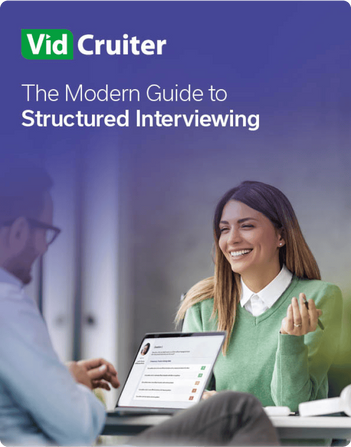
Interview Training for Hiring Managers
Explore expert tips and strategies to train your hiring managers to lead more efficient, equitable, and effective interviews.

Screening interviews narrow the number of applicants in the talent pipeline by determining if a candidate has the credentials and qualifications to move beyond the initial phase of the hiring process. This type of interview has various benefits: it speeds up time to hire, saves time spent interviewing, reduces cost-per-hire, and more.
A screening interview, or pre-screening interview, is when a talent acquisition specialist, recruiter, or HR professional asks an applicant straightforward questions about their qualifications, experience, and goals to determine if they're qualified. What it means to be qualified can change significantly depending on the role and organization.
The screening interview is the next step in the hiring process after resume screening, and the aim is to create a shortlist of candidates to pass along to the hiring manager.
The purpose of a screening interview is to:
The key to screening interviews is accurately representing the role and organizational culture, and identifying any misalignment early on. For example, if an applicant's salary expectations are well above what you can offer, a screening interview would remove the need for further interviews.
Consider structured interviewing if you’re looking for a scientifically proven way to enhance your screening interviews. It’s a best practice to use an interview guide, ask all candidates the same questions, and rate everyone using the same interview scorecard.

Better predict who will succeed from the screening interview
When you’re in a rush to hire, cutting out this first step of the interview process may be tempting, but candidate screening interviews contribute to faster and fairer hiring outcomes.
You can’t determine everything you need to know about a candidate by looking at their resume. A quick conversation can be the determining factor in advancing or eliminating some candidates. Screening applicants gives everyone who meets the requirements an equal opportunity to succeed. As a result, the hiring manager receives a diverse and qualified group of people to interview.
It also helps you spot red flags early and prevents you from advancing candidates who don’t fit your criteria. In addition to creating a more inclusive interview process, there are many benefits to conducting screening interviews.
Identify top performers early
If an applicant stands out in the screening interview compared to the other candidates, it may indicate they will be a frontrunner for the role.
Improve candidate experience
Removing applicants from the process at the earliest possible point frees them up to pursue opportunities that align better with what they have to offer the job market.
Reduce time-to-hire
Narrowing the candidate pool at the beginning saves time down the line. Candidate screening can be even more efficient if you use HR technology and leverage automation.
Reduce cost-per-hire
Did you know a high-level or highly specialized employee costs approximately 400% of their annual salary to replace? Continuously hiring and rehiring can seriously cost your organization (SimplyBenefits).
Save hiring managers time
Hiring managers are already stretched because they’re taking on an additional role. Screening values their time by ensuring they are only interviewing qualified candidates.
Build a talent pool
Some candidates may not be suitable for the role, but would greatly add to the company culture. Keep them in your talent pipeline and encourage them to keep applying.

Getting buried under a mountain of unqualified applicants isn’t uncommon
As many as 75% of applicants aren’t qualified to do the role they applied for (BusinessWire).
Screening and interviewing are the same because, technically, a screening interview is one of many types of interviews. The difference is that screening and interviewing are each associated with different stages of the interview process.
Talent acquisition specialists, recruiters, or HR professionals conduct screening interviews. It’s more of an introduction than an interview — the questions aren’t complicated, and the interview isn’t with the person who will be supervising them. According to Robert Half, a screening interview takes 15 to 30 minutes. This stage filters out unsuitable applicants to make interviewing easier.
Interviewing comes after screening, so the candidate should know a little about the organization and role. The second interview assesses for competencies, which are a combination of behavior, knowledge, skills, and abilities, and considers personality and how the candidate works and thinks. Interviews are longer, between 45 and 90 minutes, and the goal is to collect information to make a final hiring decision.
Screening and interviewing should both be structured to maintain consistency throughout canthe process. Structuring every stage can help by providing a total cumulative score at the end of the interview process that you can use to consider and compare finalists.

7 tips for conducting screening interviews
If you put in the work to plan your process, screening should be relatively easy.
Follow this advice to make it an excellent experience for the candidate:
Here are six common interview questions to ask candidates during a phone screen or any other type of screening interview and the broader types of screening questions they fall within.
1. Briefly tell me about your career so far.
This is an unconventional way of asking a candidate to walk you through their resume. It’s good because it doesn’t open the door to talking about their personal life, which can happen when you ask “Tell me about yourself.” This helps prevent the candidate from disclosing personal information that may impact your assessment, while also opening the floor for them to provide insights that aren’t on their resume.
2. What made you interested in this position?
When candidates are job hunting, there are some cases where they apply for jobs they’re not actually interested in. This question, and others like it, give you a glimpse into the candidate’s motivation.
It’s also an indirect way to invite the candidate to talk about what’s not working with their current role, and what excites them that they are not doing now. If you want to be more direct about their current job situation, you would ask, “Why are you looking for a new role?”
3. What makes you a good fit for this role?
Questions like these give you a sense of what the candidate thinks they will bring to the role. You’re getting a glimpse into their strengths, while also getting a sense of their self-perception. Are they humble, or do they seem like a know-it-all?
4. When can you start if you’re hired?
Questions about availability, hybrid work, relocation, travel frequency, or work authorization may disqualify some candidates, even if they check all the other boxes. Asking knockout questions like this in the screening interview makes sense if the answer you’re looking for is a little bit flexible.

When’s the best time to ask knockout questions?
To be more efficient and compassionate, you could place knockout questions in the application so candidates are filtered in the resume screening stage. So far, we’ve talked about screening interviews saving the hiring manager time, but making this change could save you time conducting screening interviews. It also prevents the candidate from getting their hopes up unnecessarily.

5. What are your salary expectations?
Salary questions and conversations need to happen sooner rather than later. If there’s a discrepancy between what the candidate is looking for and what you can offer, it might disqualify them.
6. What do you know about our organization?
This question, or any iteration of it, is a company knowledge question that tests how prepared the candidate is for the interview. If they did research, it would show.
How to further vet your candidates between the screening interview and the following interview
Pre-employment skills testing can be instrumental in high-volume hiring situations. Without manually scoring the tests, you can assess skills like typing speed, editing or proofing, English proficiency, Excel knowledge, numerical reasoning, and more. Using a skills test allows you to confirm the candidate has the skill level they say they have before they proceed further in the hiring process.
More and more companies are using AI interview screening and video screening interviews, but phone screen interviews are still most commonly used for screening interviews. In-person screening interviews are only practical in a handful of scenarios, which we will outline.
Phone screen interviews are the most popular screening format because of the convenience for both the candidate and the interviewer. However, there are a few downsides to conducting screening call interviews. Phone interviews require interview scheduling, which can be onerous. Also, without the right recording software, you can’t capture a high-quality recording of the phone screen for your records.

A video screening interview can be a live or one-way interview. If a job requires specialized skills, you can incorporate technical screening interview questions into a one-way interview — using images or video — to do a deeper dive into the candidate’s level of qualification.
If you are sticking to a standard video conferencing solution, you can only conduct live video screening interviews. One-way video screening requires candidate screening software.
Candidate screening software is an investment, but it allows you to review several one-way video interview submissions in the time it takes to conduct a single phone screen. It’s worthwhile if you are trying to reduce time-to-hire or do high-volume hiring. Interviewing software can also support live interviewing and enable scheduling to reduce the need for an additional tool or manual booking.
The one downside to choosing video can be tech issues, but this is not a problem if you’re using a video interview platform because they typically offer interviewers and candidates tech support around the clock. Video screening interviews keep things running smoothly, are ideal for hybrid or remote positions, and elevate the experience for the interviewer and the candidate.

It’s not common to conduct in-person screening interviews because meeting in person makes screening time-consuming, and the screening step involves the most candidates.
In some situations, an in-person screening interview makes sense. For example, at a job fair or if you’re trying to recruit a high-value candidate. Another circumstance where an in-person screening interview may make sense is if there are internal candidates who already work for the company and are looking to change departments or roles.

Messaging-based AI chatbots are one of many examples of AI in recruiting and are often used for high-volume hiring. Chatbots use natural language processing (NLP) to screen applicants by providing the candidate with questions one at a time so the experience feels more conversational. Chatbots are also used to pre-screen candidates before they book screening interviews. According to Forbes, chatbots are “increasingly being used in industries like healthcare, retail and restaurants.”
In some cases, the AI will assess a candidate’s answers and make a hiring recommendation. Chatbots with this capacity typically filter candidates based on text-based responses. Depending on the vendor, it may consider different variables, like how long it takes the candidate to respond, how easy it is to read their sentences, and whether they use complex grammar or large words.
Unfortunately, any unsupervised reliance on AI in HR introduces a risk of eliminating qualified candidates for illegitimate or unknown reasons without ever interacting with them.
While chatbots can save you time screening candidates, NLP is not equivalent to human understanding. It can introduce hiring biases into the screening process and increase your organization’s lawsuit liability.
Overall, it’s important to be aware of both the pros and cons of using screening chatbots. While they can accelerate your screening process, they can also leave candidates with a negative impression (Indeed).

Chatbots help recruiters, but do they make the process easier for candidates?
Business Insider published a piece about one person’s experience applying for five fast food jobs. Ultimately, they landed a part-time role at the only place with a human point of contact during the application process.
What was their experience like with the other fast food restaurants?
The author said, "To be fair, AI chatbots can make it easier to screen applicants and schedule interviews…but the chatbots I encountered made it harder for me to get the job.”
A pass rate indicates how often you move candidates to the next step in the hiring process. A pass rate of 30 to 50% is ideal, but it also depends on the recruiter and the role.
According to SafeGraph, “the more you’ve hired for a role in the past, the higher the pass rate (30-50%), and the less you’ve hired for a position in the past, the lower the pass rate (10-30%).”
Aside from determining if the candidate is qualified, is there anything else worth noting in the screening interview? Absolutely. Like any interview, you want to pay attention when a candidate provides incomplete or vague answers, badmouths past employers, lacks professionalism, or seems disengaged.

E-BOOK
The Modern Guide to Structured Interviewing
Get your free copy of VidCruiter’s comprehensive white paper about structured interviewing. This practical guide:
By providing email address, you agree to receive
updates from VidCruiter.
Read our
Privacy Policy
.
Modernize your hiring process with expert insights and advice.